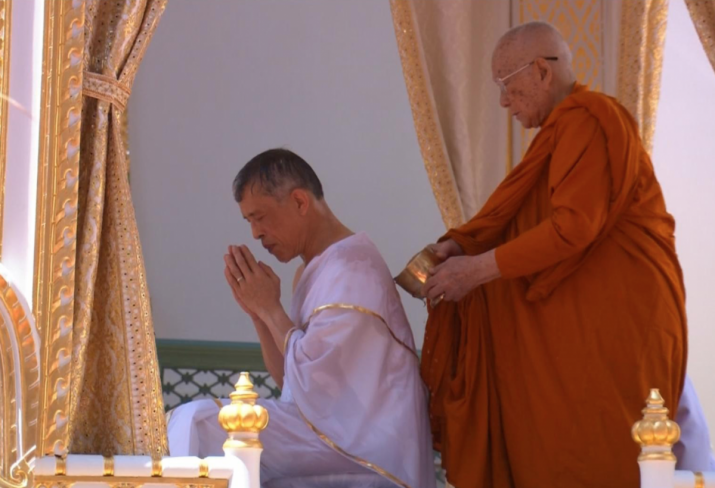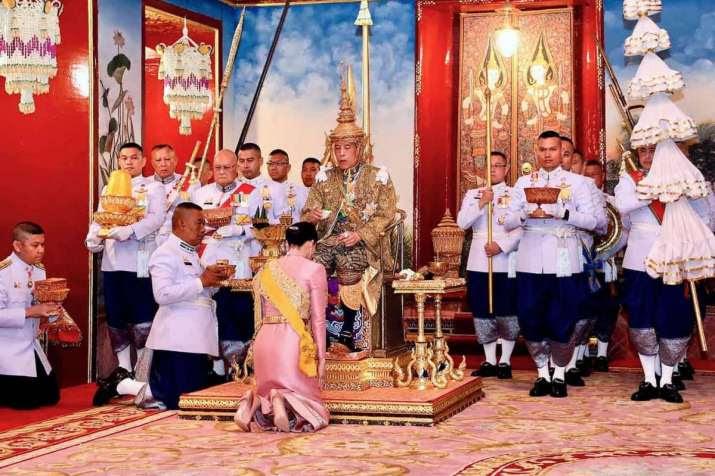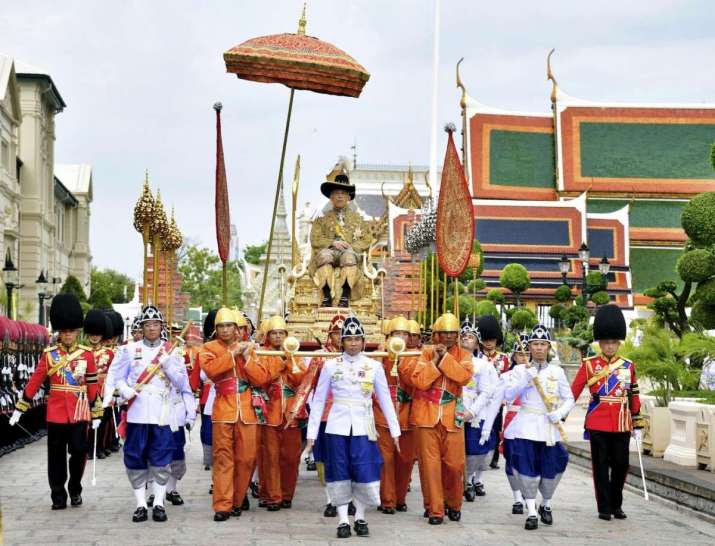
By Shyamal Sinha

Concluding an elaborate series of Buddhist and Brahmin ceremonies and rituals spread over three days, Thailand completed the formal coronation of its new king, Maha Vajiralongkorn, also known as Rama X as the 10th monarch of the Chakri dynasty, which has ruled the kingdom since 1782. In his first royal command, the new monarch proclaimed: “I shall continue, preserve, and build upon the royal legacy and shall reign with righteousness for the benefit and happiness of the people forever.” (Reuters)
Sixty-six-year-old King Maha Vajiralongkorn (b. 28 July 1952)—his formal reigning title is Phrabat Somdet Phra Vajira Klao Chao Yu Hua—ascended to the throne in October 2016, after the death of his father, the late King Bhumibol Adulyadej (r. 1946–2016). The coronation date was set following a period of official mourning for his revered father.
The pomp and pageantry began on Saturday at the auspicious time of 10:09, when the king, dressed in white robes, sat beneath a canopied fountain for a purification ritual. Thailand’s most senior Buddhist monk, the supreme patriarch, poured consecrated waters over the king, followed by Brahmin priests, and members of the royal family.
The solemn main coronation ceremony was held in the throne hall of Bangkok’s famed Grand Palace complex, home to the royal court until 1925. Amid formal religious rituals, the king, the only son of King Bhumibol Adulyadej and his consort Queen Sirikit, was enthroned beneath a nine-tiered umbrella, where he was presented with elaborate symbolic royal regalia—the 7.3-kilogram, diamond-tipped Great Crown of Victory, the Royal Slippers, the Royal Fan and Fly Whisk, the Royal Sword of Victory, and the Royal Scepter.

A royal procession was held later in the day, bearing the king on a royal palanquin from the Grand Palace to Wat Phra Kaew, the Temple of the Emerald Buddha, where the monarch proclaimed himself the protector of Buddhism in Thailand before 80 chanting monks, stating: “I will rightfully protect Buddhism forever.” (Reuters)
Also in attendance was the new Queen Suthida, a former Thai Airways flight attendant, who received her full royal title, following a surprise announcement just three days before the coronation that the monarch had married for a fourth time. In his first address on Saturday to members of the royal family, the Privy Council, and top government officials, the king called for unity amid a protracted period of political uncertainty in Thailand.
“I invite everyone here and all Thai people to share my determination and work together, each according to his status and duty, with the nation’s prosperity and the people’s happiness as the ultimate goals,” the monarch said. (Reuters)
Well-wishers flocked to the streets on Sunday for a royal procession in which the king, after granting new royal titles to members of the royal family, was borne upon a gilded palanquin along a seven-kilometer route through the streets of the city from the Grand Palace to three royal Buddhist temples: Wat Bovoranives, Wat Rajabopidh, and Wat Phra Chetuphon, where he prostrated before the main Buddha images and offered alms to monks.
Earlier on Monday, Thailand’s king and queen greeted the public from the balcony of Suddhaisavarya Prasad Hall in the Grand Palace before holding an audience with foreign diplomats.
The elaborate and ornate Buddhist and Brahmin traditions, staged at an estimated cost of 1 billion baht (US$31.4 million), reflected the ancient cultural and spiritual influence of India, with the three-day process representing the monarch’s transformation from a member of the royal family to a semi-divine “Devaraja.”
Since becoming king, Vajiralongkorn has moved to consolidate the authority of the monarchy, including a firmer hand in the managing of the crown’s vast wealth, with the help of the country’s military government. Although absolute anarchy in Thailand ended in 1932, the kingdom’s strict lèse majesté laws mean criticism of the king and other members of royal family is forbidden, with hefty fines and prison sentences meted out to offenders.
The coronation comes during a time of political upheaval for Thailand, with growing public discontent toward the self-appointed military junta that has governed the kingdom since a coup d’état in 2014. The country held its first general election since the coup on 24 March, however the outcome of the poll remains uncertain as the authorities have repeatedly delayed announcing the official final results amid criticisms of errors and irregularities.

The coronation comes more than two years after King Maha Vajiralongkorn ascended to the throne with the passing of his father. King Bhumibol Adulyadej (r. 1946–2016) passed away on 13 October 2016 at the age of 88, following many years of ill health. The late king, also known as Rama IX, was the world’s longest-serving head of state and the longest-reigning monarch in Thai history, having sat on the throne for more than 70 years. Widely loved and respected in Thailand, he was seen as a unifying figure of stability in the country that has struggled through decades of political instability punctuated by numerous military coups.
Thailand is predominantly a Theravada Buddhist country, with 94.5 per cent of the kingdom’s population of 69 million identifying as Buddhists, according to census data for 2015. The next most prominent religion is Islam, representing 4.29 per cent.
source — Buddhistdoor Global











